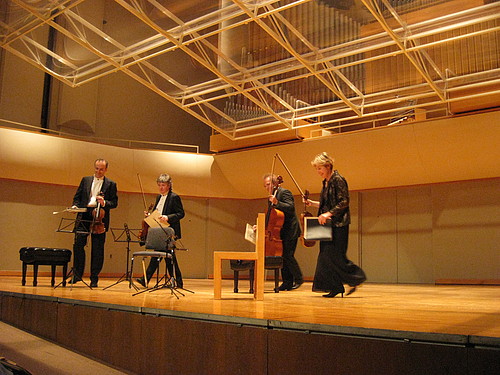Formed in 1975 by four college students in Budapest after a pickup soccer game, and now, 35 years later, centered in Boulder, Colorado and touring the world as one of the most prominent string quartets in existence, the Takács Quartet decided to visit Carleton.
Here they are, taking their places in the Concert Hall:

The songs they played that evening were Beethoven Op. 18 No. 4, Haydn Op. 71 No. 1, and Beethoven Op. 132. I'm not a student of music, so I'm afraid I can't say anything intelligent about the pieces themselves or the style with which the Takács Quartet played them, other than that it was obviously excellently done.
What I did notice, though, apart from the music, was the movement and physical expressiveness of the quartet members. The violinists, especially, swayed and swung their heads from side to side in time with the music and allowed their posture to vary wildly with the music, sometimes slouching deeply, sometimes sitting up very straight, and at other times jumping up to a half-standing position before falling back down again on their seats.
Edward Dusinberre, the first violinist, raised his eyebrows and smiled during the peaceful-sounding parts of the music, and frowned and knitted his brows during the more violent parts. It might have been my imagination, but he also seemed to give signals to the other three by breathing: for example, he would occasionally draw a quick breath, and then there would be a pause in the music, and then he would exhale in a little puff and all four would start playing again. I was sitting in the front row and almost certainly would not have noticed this if I had been farther back. It seemed like he was almost playing the role of a conductor,* but using his breath patterns instead of his hands. This might be something I made up, or it might be a special technique of the Takács Quartet, or it might be a common convention that many string quartets use, but I thought it was intriguing.
One thing that is certain is that you don't get to listen to this kind of music every day, and I'm glad that Carleton works with musicians like the Takács Quartet to bring us free concerts like this one.
*If he's almost a conductor, but not quite, does that make him a semiconductor?